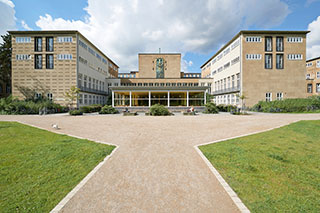Two research projects of the University of Cologne successfully applied for the funding programme ‘Profilbildung’ by the Ministry of Culture and Science of the State of North Rhine-Westphalia: i-HEAD (Immunometabolism in Health and Disease) and HESCOR (Cultural Evolution in Changing Climate: Human and Earth System Coupled Research). Over a period of three years, the selected projects will each receive funding of around 3 million euros starting from November 2023. The funding instrument ‘Profilbildung’ is intended to provide creative scope for the development of innovative and forward-looking research topics and to permanently increase the visibility and competitiveness in new research areas.
The project ‘Immunometabolism in Health and Disease (i-HEAD)’, led by biologist Professor Alga Zuccaro, aims at investigating the latest advances in research into the innate immunity of plants and animals and the role of microbiota. Based on the findings, a new set of open-source bioinformatics tools, models and uniform concepts for immune metabolism in animals and plants will be developed. The knowledge about immune metabolism is to be used to research strategies and therapeutics in plant protection and for the treatment of diseases (such as infectious and metabolic diseases in humans). The central goal of this interdisciplinary consortium of the Faculty of Mathematics and Natural Sciences (including the Departments of Chemistry, Physics and Biology) and the Faculty of Medicine of the University of Cologne in cooperation with the Max Planck Institute for Plant Breeding Research is to establish immunometabolism as an emerging research field in the area of host-microbe interaction.
The aim of the project ‘Cultural Evolution in Changing Climate: Human and Earth System Coupled Research (HESCOR)’ is to develop a new scientific field of research linked to the Human-Earth system through a multidisciplinary, cross-Faculty structure. The project investigates how the constellation and interaction between the human and the Earth systems influenced human cultural development during the most important phases of human expansion. Scientists from the Faculty of Mathematics and Natural Sciences and the Faculty of Arts and Humanities are involved, bringing together methods from the fields of Earth System Science, Archaeology, Human Systems Science, Data Analysis, Scientific Computing and Machine Learning. The project considers the cultural evolution of the Palaeolithic and Neolithic and examines how migration, population networks, demographic developments and interactions between the human and Earth systems have taken us to where we are today. HESCOR focuses on the correlations between the human and Earth systems, thereby introducing a new scientific direction in Human-Earth system coupled research.
Media Contact:
I-HEAD
Professor Dr Alga Zuccaro
Cluster of Excellence on Plant Sciences - CEPLAS
Institute for Plant Sciences
University of Cologne
+49 221 470 7170
azuccarouni-koeln.de
HESCOR
Yaping Shao
Institut für Geophysik und Meteorologie
Universität zu Köln
+49 (0)221 470-3688
yshaometeo.uni-koeln.de
Press and Communications Team:
Robert Hahn
+49 221 470 2396
r.hahnverw.uni-koeln.de
Weitere Informationen:
Exzellenzcluster für Pflanzenforschung CEPLAS
